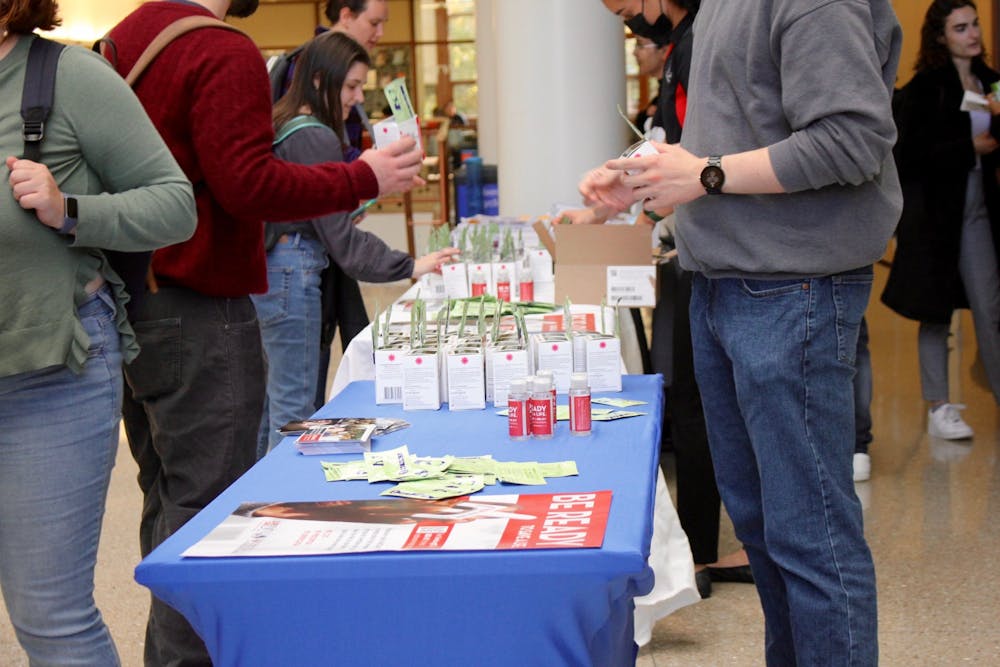The American University Police Department will be trained to carry and administer Narcan, according to an email sent to the AU community Thursday by Vice President of Student Affairs Raymond Lu-Ming Ou and Chief Financial Officer Bronté Burleigh-Jones.
The University is also “exploring the feasibility of providing placements of naloxone boxes, supplied with Narcan, across campus,” but did not specify when asked what criteria is being used to make the determination.
“Our approach remains based on a commitment to the health and safety of our community, specifically by providing harm reduction measures in a variety of ways,” Ou and Burleigh-Jones wrote in the email.
AUPD officers have already begun to undergo Narcan training in partnership with the D.C. Department of Behavioral Health, Matt Bennett, the University’s vice president and chief communications officer, wrote in an email statement to The Eagle.
“Each officer is required to complete the training and to carry Narcan as part of AUPD’s daily patrol officer training and equipment,” Bennett wrote. “Initial training for AUPD officers will be completed by the end of the month. Training is an hour-long, in-depth educational session to recognize the signs of an opioid overdose and learn how to administer Narcan and care for the individual in need.”
The University launched a community-based health initiative around naloxone last year, and has since held Narcan trainings in partnership with a third-party organization, according to Ou and Burleigh-Jones’ email. The Center for Well-Being Programs and Psychological Services also hosted a continuation of the training in partnership with the DC Department of Behavioral Health. The next training will be held on Nov. 15.
Other schools have implemented Narcan training and distribution programs, including the University of Maryland at College Park, Columbia University and Ithaca College.
Narcan, the brand name for the nasal-spray form of the medication naloxone, can reverse an opioid overdose by blocking the opioid from binding to receptors in the nervous system, with limited side effects. However, it will not affect someone overdosing on a different type of drug. It was approved by the Food and Drug Administration for over-the-counter use in March.
Many fatal drug overdoses involve fentanyl, a synthetic opioid that has been approved by the FDA for use as an anesthetic and for pain relief. According to the Drug Enforcement Administration, it is 100 times more potent than morphine and just one kilogram of the substance is powerful enough to kill 500,000 people. Fentanyl is sometimes mixed with other drugs — like heroin, cocaine and methamphetamine — to make them more potent, increasing the chances of a lethal overdose.
D.C. has been hit particularly hard by fentanyl. In 2020, the District saw 411 deaths from opioid overdoses, 94 percent of which involved fentanyl or a fentanyl analog, according to the DC Department of Behavioral Health.
The AU community felt fentanyl’s impact when Eli Weinstock, then a sophomore in the School of Communication, died of an accidental fentanyl overdose in his off-campus apartment in 2021.
More recently, 475 AU students, alumni and faculty members signed an open letter to University President Sylvia Burwell and Jacquelin Darby, the then-director of Well-Being programs, demanding the University make Narcan available in all dorms. The letter followed an alleged overdose in McDowell Hall the previous morning.
“To wait to implement Narcan at AU is unethical and deadly. Students will continue to use substances during college, and it is in the interest of their health to prepare for action,” the letter said. “As members of the University, past and present, we are incredibly disappointed in the lack of action to prepare for this incident, particularly given the major push from students over the past 5 years for Narcan to be available.”
The University did not answer The Eagle’s request for comments on whether or not student pushback contributed to the development of AU’s harm reduction strategy or if they will incorporate other methods of harm reduction.
This article was edited by Tyler Davis and Abigail Pritchard. Copy editing done by Isabelle Kravis and Daniel Carson.





